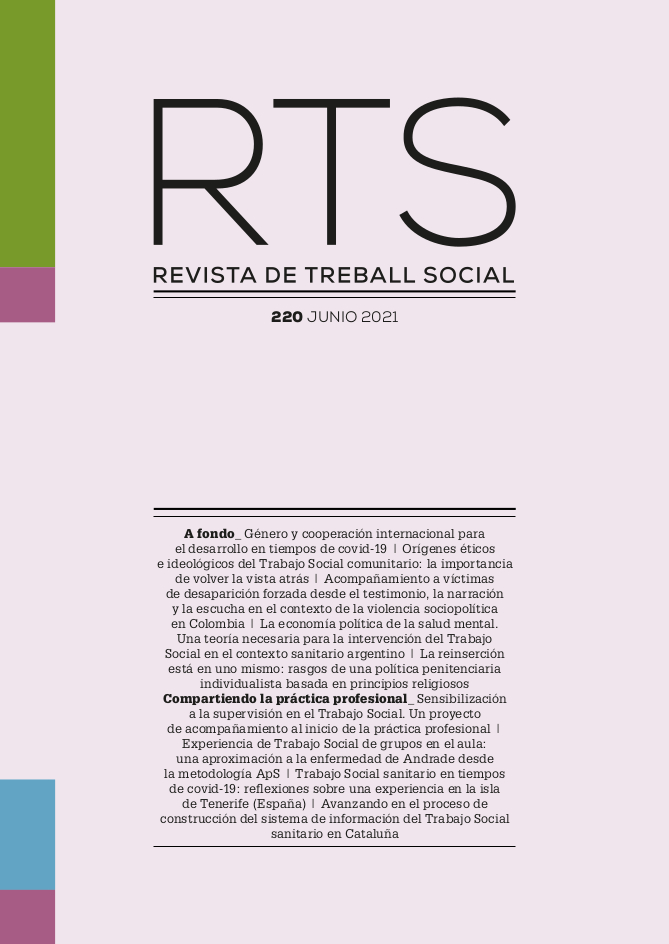In cooperation with the Balearic Association for Corino de Andrade’s Disease (ABEA), the University of the Balearic Islands has carried out a teaching innovation project in one of its group social work subjects on the context of the 17th SDG. The main objective was to raise awareness among future social work professionals about people affected by Corino de Andrade’s disease and their families. Rare diseases are a source of significant distress for affected people and their families; therefore, a professional’s lack of understanding or knowledge constitutes a handicap when it comes to delivering responses based on these people’s needs. In this service learning project, the development of a group experience was put forward which could be extrapolated to the community aimed at ABEA members, consisting of a life experience. The students experienced both the role of the social worker as enabled by the group and the role of the affected person or that of the caregiver or family member. The students benefitted from the support of some ABEA members, who shared their experience. The outcomes suggest that without prior knowledge about this specific disease, the students enhanced their theoretical and emotional knowledge level. Stepping into the shoes of the affected person or the family member placed them in a different position, fostering a work ethic founded on a perspective of empathy and cooperation. The project involved bringing society, groups –which in many cases have been veiled– and the university together.
Article
The social work experience of groups in class: an approach to Corino de Andrade’s disease based on the Service Learning Methodology
Asociación Balear de la Enfermedad de Andrade (2021). ABEA. Recuperado de http://andradebalear.es/
Consejo General del Trabajo Social. (2021). La contribución del Trabajo Social al cumplimiento de los ODS. [Webinar Trabajo Social]. YouTube. https://www.youtube.com/watch?v=SZD7ai1sd6I&feature=youtu.be
CRUE / Comisión de Sostenibilidad. (2015). Institucionalización del Aprendizaje-Servicio como estrategia docente dentro del marco de la Responsabilidad Social Universitaria para la promoción de la Sostenibilidad en la Universidad. Documento técnico aprobado por el Comité Ejecutivo y el Plenario de la Comisión de Sostenibilidad (Grupo CADEP), celebrado en León el día 29 de mayo de 2015.
Kenny, M., Simon, L. A. K., Kiley-Brabeck, K., and Lerner, R. M. (Eds.) (2002). Promoting Civil Society Through Service Learning: A View of the Issues. In Learning to Serve. Promoting Civil Society Through Service Learning (p. 1-14). Springer.
Manzano-Arrondo, V. (2012). La función comprometida de la universidad. (Unpublished Ph.D. dissertation). Universidad de Valladolid.
Mayor, F. (2009). La problemática de la sostenibilidad en un mundo globalizado. Revista de Educación, núm. extr., 25-52.
Muñoz, C. (2012). Responsabilidad Social Universitaria: Aportes al enriquecimiento del concepto desde la dimensión de las prácticas. En Documento de Trabajo Nº 23. Serie Documentos de Trabajo. Instituto Universitario de Desarrollo y Cooperación IUDC-UCM.
Naciones Unidas. (2021). Agenda 2030 para el Desarrollo Sostenible. Recuperado de: https://www.un.org/sustainabledevelopment/es/
Negre, F., de Benito, B., and Verger, S. (2018). Más allá del voluntariado: Una aproximación al Aprendizaje-Servicio para la formación inicial de profesorado en el ámbito de la pedagogía hospitalaria. International Studies on Law and Education, 29/30, 147-166.
Parra, B. (2014). Una revisión del trabajo social grupal. Revista de Treball Social, 201, 23-29.
Paz-Lourido, B. (2017). El Aprendizaje-Servicio, ¿una metodología a considerar en la formación universitaria en Fisioterapia? Fisioterapia, 39(6), 227-228.
Paz-Lourido, B.; Negre, F.; Verger, S., and de Benito, B. (2018). L’aprenentatge-servei a l’educació superior: de les experiències puntuals a la institucionalització. In T. Lleixà Arribas, B. Gros Salvat, T. Mauri Majós, and J. L. Medina (Coords), Educació 2018-2020. Reptes, tendències i compromisos. IRE-UB.
Raya-Díez, E., and Caparrós, N. (2013). Aprendizaje-Servicio en las prácticas externas de Grado. La experiencia de la Universidad de la Rioja en el Grado de Trabajo Social. Revista internacional de educación para la justicia social (RIEJS), 2(2), 131-154.
Real Decreto 1791/2010, de 30 de diciembre, por el que se aprueba el Estatuto del Estudiante Universitario, BOE núm. 318 § 20147 (2010).
Rubio, L., Prats, E., and Gómez, L. (Coords.). (2013). Universidad y sociedad. Experiencias de aprendizaje servicio en la universidad. Colección Educación y Comunidad, 8. Institut de Ciències de l’Educació. Universitat de Barcelona.
Speck, B. W. (2001). Why Service-Learning?. New directions for higher education, 114, 3-13.
Tapia, M. N. (2006). Aprendizaje y servicio solidario en el sistema educativo y las organizaciones juveniles. Editorial Ciudad Nueva.
Tapia, M. N. (2018). El compromiso social en el currículo de la Educación Superior. CLAYSS.
UNESCO (1998). Declaración mundial sobre la educación superior en el siglo XXI: Visión y acción. Educación Superior y Sociedad. Conferencia mundial sobre la educación superior, 9(2), 97-113.





